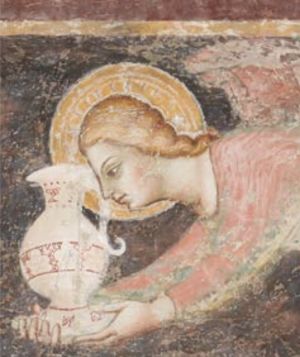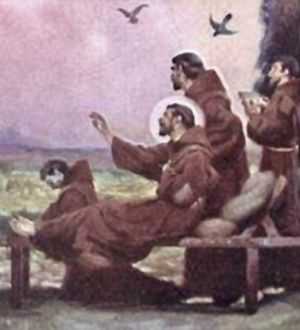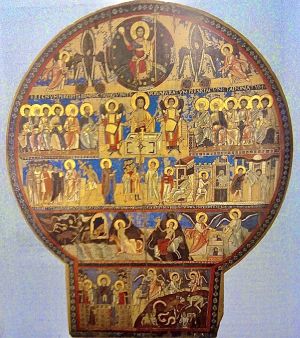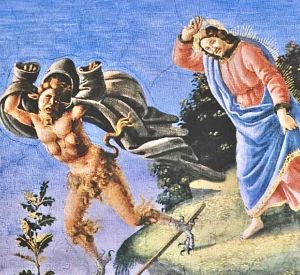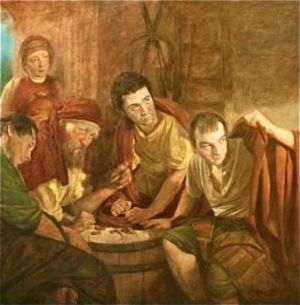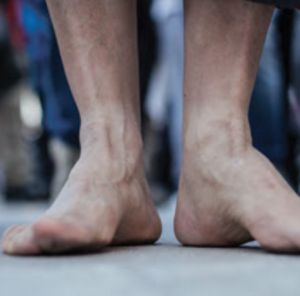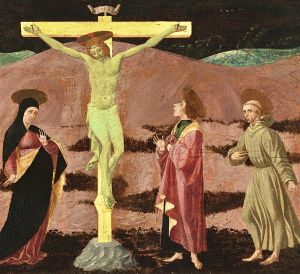
Teresa Girolami
Teresa Girolami è laureata in Materie letterarie e Teologia. Ha pubblicato vari testi, fra cui: "Pellegrinaggio del cuore" (Ed. Piemme); "I Fiammiferi di Maria - La Madre di Dio in prosa e poesia"; "Tenerezza Scalza - Natura di donna"; co-autrice di "Dialogo e Solstizio".
Knock: it will be opened to you!
The Matthew passage emphasises the goodness of the Father, who does not give a stone to the son who asks for bread. Then here is the golden rule: what one wants for oneself, it is good to do for others.
For Francis of Assisi, giving to those in need was a law of life. This verb, 'to give', was often replaced by another typically Franciscan one: 'to give back'.
For him, handing over his cloak to a poor man who knocked on the door of his heart meant giving back what he had lent.
On the other hand, as the Gospel says, what we wish to be done to us, we must also do to our neighbour (cf. Mt 7:12).
At the same time, he considered it important and a sign of humility to know how to ask.
After his change of life, obeying the voice of the Crucifix of San Damiano and overcoming himself, he gave himself to countless labours.
The Sources narrate:
"Francis, a man of God, naked of the things of the world, consecrated himself to divine worship and, no longer minding his own advantage, committed himself to serving God in every way possible.
Returning to the church of St Damian, all happy and fervent, he put on a hermit's habit and comforted the priest of that church with the same words of encouragement addressed to him by the bishop.
Then, returning to the city, he began to walk through squares and streets, raising praises to the Lord with an inebriated soul.
As he finished his praises, he worked to obtain the stones needed to restore the church. He would say:
«Whoever gives me one stone, will have one reward; whoever gives me two stones, two rewards; whoever gives me three, as many rewards!».
With ardent enthusiasm he made this and similar appeals full of naivety, for this chosen one of God had a candid and childlike soul, he did not resort to the learned language of human wisdom, but was simple and immediate in everything" (FF 1420).
According to the Poverello, begging for the love of God was the noblest and most dignified gesture before the Lord and the world.
"And indeed, everything the heavenly Father has created for the benefit of mankind, he continues to give to us gratuitously even after sin, to the worthy as well as the unworthy, out of love for his beloved Son" (FF 1610).
«Ask and it will be given to you, seek and you will find, knock and it will be opened to you» (Mt 7:7)
Thursday 1st wk. in Lent (Mt 7,7-12)
The only Sign
In Lenten season, liturgy emphasises the importance of changing one's life, without going for signs.
One 'sign': that of the Crucified One, of Jesus who died and rose again for all.
By derivation, an eloquent sign becomes an existence converted to the praise of God.
According to St Bonaventure, Francis is symbolised in the figure of the second angel [the first is Christ] who ascends from the east (cf. Rev 7:2) and bears within him the seal of the living God.
This is confirmed by his mission to call men to penance and mark the elect with the sign of the Tau*, and above all by his being himself transformed, even in body, into the Crucified Christ.
«This generation [...] seeks a sign, but no sign will be given it except the sign of Jonah» (Lk 11:29)
The Sources attest:
"This herald of God, worthy to be loved by Christ [...] is the servant of God Francis [...] an example of perfection for the followers of Christ.
We are moved to embrace, with faith and piety, this conviction by the fact that he had the mission from heaven to call men to weep, to mourn, to shave their heads and to gird their loins, and to impress, with the sign of the penitential cross and with a habit made in the shape of a cross, the Tau on the foreheads of those who weep and mourn.
But he confirms in it, with its incontestable truth, the testimony of that seal that made him like the living God, that is, like Christ Crucified. A seal that was imprinted in his body not by the work of nature or the skill of an artificer, but rather by the marvellous power of the Spirit of the living God" (FF 1022).
The Crucifix in Francis: icon of rebirth through a continuous existential exodus. A life marked by the love of God.
* Letter of the Hebrew and Greek alphabet, whose shape recalls the figure of the cross.
* Francis chose it as his seal and signature. Brother Pacifico contemplated it shining on his forehead.
Wednesday 1st wk. in Lent (Lk 11:29-32)
Treasury of Prayer
Jesus invites his disciples to a prayer that is not long-winded, but bare, essential; as children.
Although in different paradigms, Clare and Francis of Assisi were aware that in the depths of their being lurked a secret to be found in order to be reborn and healed.
To the point that, distancing himself from his earthly father, before the local bishop, the Poverello expressed himself thus:
"Hitherto I have called you, my Father on earth; from now on I can say with all confidence: OUR FATHER, WHO IS IN HEAVEN, because in Him I have placed all my Treasure and placed all my Trust and Hope" (FF 1043).
To his brothers who asked him to teach them how to pray, he replied:
"When you pray, say: Our Father, and [...] We adore you, O Christ, in all your churches that are in the whole world, and we bless you, because through your holy Cross you have redeemed the world" (FF 1068).
And in the paraphrase of the "Our Father" we find:
"Hallowed be thy Name: let the knowledge of Thee be made bright in us, that we may know the breadth of thy benefits, the extent of thy promises, the sublimity of thy majesty and the depth of thy judgments" (FF 268).
A prayer, therefore, attested by life, by the capacity for forgiveness, in Listening.
All in the cell of one's own body, Francis maintained - as the Perugina Legend reminds us:
"Wherever we are or move, we take our cell with us: brother body; the soul is the hermit who lives in it praying to God and meditating.
And if the soul does not live serenely and solitarily in its cell, it is of little use to the religious to have a cell erected by the hand of man" (FF 1636).
And in the Legend, Clare herself:
"How much strength and support she received in the furnace of ardent prayer [...] she brought back from the fire of the altar of the Lord burning words, such as to inflame the hearts of the sisters" (FF 3199).
A prayer not marked by the multiplication of words, but by an authentic and profound relationship with God, who knows everything.
«When you pray, do not babble like the pagans, for they think they will be heard because of their wordiness» (Mt 6:7)
Tuesday 1st wk. in Lent (Mt 6,7-15)
Come ye Blessed!
When the nations are gathered before the Lord, the works of blessing performed will speak for them.
They will be in the divine condition those who recognised Christ himself in the needy of all kinds, perhaps without having realised it.
They will not be in the eternal Light who did not serve the small and infirm.
Francis, a creature of noble and sensitive heart, from his youth, before the poor felt in his conscience the need not to turn away.
This tender inclination increased considerably after meeting the Lord.
We read in the Sources stupendous documentation of real life.
"God, in fact, had infused the young Francis' soul with a feeling of generous compassion, which, growing with him from childhood, had filled his heart with goodness; so much so that even then, not a deaf hearer of the Gospel, he was willing to give to anyone who asked him, especially if he asked for the love of God.
Once, all busy in his shop, he sent away empty-handed, against his custom, a poor man who asked for alms for the love of God. But immediately, coming to his senses, he ran after him, gave him a generous alms, and promised the Lord God that from then on, when he had the chance, he would never say no to anyone who asked him for the love of God.
And he observed this intention until his death, with untiring piety, deserving to grow abundantly in the love of God and in Grace.
In fact, he would later say, when he was perfectly clothed with the sentiments of Christ, that even when he was living as a secular, he could hardly hear the love of God mentioned without feeling an inner turmoil" (FF 1018).
«Come, ye blessed of my Father [...] for I was hungry and you gave me food» (Mt 25:34)
The Sources also tell of a woman who came from Machilone to Rieti to have her eyes treated.
The doctor, who went to Francis, told him about this poor creature, claiming that he would cure her free of charge and pay the expenses himself.
The Poor Man, then, immediately went to his guardian, claiming that he had to return the goods of others.
The superior asked him what he was referring to and Francis replied:
"This is the cloak we borrowed from that poor woman who is sick of her eyes: we must return it to her" (FF 1602).
The guardian agreed.
Then the Minim called a spiritual man, with whom he was intimate. He handed him the cloak and twelve loaves, urging him to go to the oculist and have him point out the poor woman to whom he should hand it.
"Go and say to that poor and infirm woman: 'The poor man, to whom you have lent this cloak, thanks you from his heart for the loan you have made. And now, take what belongs to you'" (FF 1602).
The friend did as the saint had suggested. The woman, unable to make up her mind and in distress and suspicion, replied: 'Leave me alone. I don't know what you are saying' (FF1602).
But the man put the cloak and the twelve loaves into his hand. Then the poor woman was convinced that he meant what he said, confused between worry and happiness. Fearing, then, that the help she had received would be taken away from her, she went back to her house at night.
Francis had instructed his guardian to pay the poor sick woman's expenses every day as long as she remained in Rieti.
The Sources also underline what his brothers attested:
"We who lived with him can testify that Francis, whether healthy or infirm, overflowed with love and tenderness not only for his brothers, but towards all the poor, both healthy and sick.
He deprived himself of the necessities, which the brothers procured for him with solicitude and affection - not without showing himself caressed by us, so that we would not be disappointed - in order to offer them with great joy to others, taking from his own body even that which was indispensable" (FF 1602).
Charity speaks for itself!
«Come, ye blessed of my Father, inherit the kingdom [...] for I was hungry and you gave me food» (Mt 25:34)
Monday 1st wk. in Lent (Mt 25:31-46)
Desert, solitude, adoration
The enemy suggests to the Son of God a different way from the Father, but Jesus shrugs off that stench.
Francis' life had undergone a radical change when the Physician Jesus had spoken to him.
The Poor Man had realised that he was loved and that, by following Him, he would be healed from self-worship to render it to God alone.
The Crucifix at San Damiano and the leper he had met had changed him inwardly.
The Minim of Assisi devoted himself to frequent fasts and nights in prayer, for periods of forty days (in consonance with the forty days Jesus spent in the desert).
He did this often - apart from the period before Easter.
At those times he would suspend his apostolic commitments, retiring to hermitages: simple and austere places, far from the cities.
There, as his biographer Celano recalls, he would build his nest in the clefts of the rock*.
The Sources chronicle his Lenten periods, where he was often put to the test.
"Two years before he rendered his spirit to God, after many and various labours, divine Providence drew him aside and led him to a lofty mountain, called the mountain of La Verna.
Here he had begun, according to his custom, to fast during Lent in honour of St Michael the Archangel, when he began to feel flooded with extraordinary sweetness in contemplation, inflamed by a more lively flame of celestial desires, filled with richer divine gifts [...] intent on seeking God's will, to which he yearned with the greatest ardour to conform himself in everything" (FF1223).
La Verna was par excellence "the desert" of Francis, where, as happened to Jesus in arid places, he was subjected to oppressive temptations.
While the Saint was in prayer, there "came a great multitude of ferocious demons [...] and they began strongly to fight and vex him" (FF 1901).
But he began to shout aloud:
"«O damned spirits, you can do nothing except as much as the hand of God permits you [...] And I am prepared to cheerfully endure every punishment and every adversity that you, my God, want to send me for my sins».
Then the demons, confused and overcome by his constancy and patience, departed" (FF 1901).
He fed more than on material bread on that of the Holy Word and taught his brothers to adore God alone, wherever they were, trusting in divine care and solicitude.
In fact, his sons, faithful to Francis' exhortation, when they passed near a church, would stop and prone, with body and spirit, adore the Almighty, saying: «We adore you, O Christ, in all your churches» (FF 401).
The power of the Holy Spirit placed them in the right attitude of need, before power or success, just as Christ had instructed them, without allowing themselves to be caged by such seductions.
«It is written: The Lord thy God shalt thou worship, and him only shalt thou worship».
«And the Spirit drove him into the wilderness, and he was in the wilderness tempted by the satan, and was with the beasts»
*Famous is the hermitage of the Carceri, near Assisi; in reality Francis created twenty in central Italy.
[1st Sunday in Lent]
Minority and mirrors
Levi's call and sharing the table with him produced scandal among the Pharisees, but Jesus taught them that it is the sick who need the doctor!
Francis and Clare saw in their vocation and that of the brothers and sisters who followed them an attractive and fundamental appointment in their existence.
Through the Call, God was realising a secret gift in them, far beyond the expectations of a petty life.
Regarding Francis, we read in the Sources:
As he was passing near the church of St Damian, he was inspired to enter it. He went there, and began to pray fervently before the image of the Crucifix, who spoke to him with moving goodness:
"Francis, do you not see that my house is falling down? Go, then, and restore it".
Trembling and astonished, the young man replied:
"I will do it gladly, Lord".
However, he had misunderstood; he thought it was about that church which, because of its antiquity, threatened imminent ruin.
At those words of Christ he became immensely happy and radiant; he felt in his soul that it was really the Crucified One who had given him the message.
As he left the church, he found a priest sitting nearby, and putting his hand in his purse, he offered him money, saying:
"Sir, I beg you to buy oil to make a lamp burn before that Crucifix. When this money is finished, I will bring you more, according to need" (FF 1411).
The Poverello, considering minority as a specific vocation of the Friar, was worried because "he saw that some ardently desired the offices of the Order, of which they made themselves unworthy, apart from anything else, even for the mere ambition to govern. And he said that these were not Friars Minor, but had forgotten their vocation and had fallen from glory" (FF 729).
Clare, regarding the vocation of the sisters residing at San Damiano, also expressed herself in her Testament as follows:
"The Lord himself has placed us as a model, as an example and mirror not only for other men, but also for our sisters, those whom the Lord himself has called to follow our vocation, so that they too may shine as a mirror and example for all those who live in the world" (FF 2829).
«I did not come to call the righteous, but sinners to conversion» (Lk 5:32)
Saturday after the Ashes (Lk 5:27-32)
Franciscan Lent: air of Freedom
The Minim forbade excesses
Jesus replied to John's disciples, who were fasting a lot, surprising them: as long as the Bridegroom is with his wedding guests, they cannot fast.
Francis knew well how to discern between the importance of fasting and the exaggeration of doing it. Indeed, in his life, never did form take the place of substance.
The Sources illustrate:
"Francis rebuked his brothers who were too hard on themselves and who reached exhaustion by dint of vigils, fasts, prayers and corporal penances [...].
The man of God forbade such excesses, admonishing those brothers lovingly and calling them to common sense, healing their wounds with the medicine of wise instructions [...].
He spoke with them, identifying himself with their situation, not as a judge then, but as an understanding father with his children and as a compassionate doctor with his own sick. He knew how to be sick with the sick, afflicted with the afflicted" (FF 1470).
All this while being "a new man, [who] with new virtues renewed the way of perfection that had disappeared from the world" (FF 3162).
«Can the wedding guests be afflicted as long as the Bridegroom is with them?» (Mt 9:15)
Friday after Ash Wednesday (Mt 9:14-15)
Two Sisters: Denial in Charity
Jesus emphasises how 'to lose' one's life for the cause of the Kingdom is, in truth, to gain it.
Francis, at the beginning of the Regola non bollata (1221), writes that the brothers wished to live following the example of the Lord Jesus.
He emphasises various expressions of the Gospel, highlighting the importance of denying oneself and taking up the cross.
The pious father often gathered his sons around him and spoke at length about the Kingdom of God "the contempt of the world, the necessity of denying one's own will" (FF 1058), teaching them.
"Go [...] proclaim peace to men; preach penance for the remission of sins. Be patient in tribulation, watchful in prayer [...]" (FF 1058).
Leaving oneself to embrace the call in all its breadth, willing to lose one's life to find it in the incarnate Word, was the motif of their daily life.
Illuminating is a passage from the Sources, taken from the Major Legend:
"While one day he was praying, so isolated from the world, and was all absorbed in God, in the excess of his fervour Christ Jesus appeared to him, like one confined on a cross.
On seeing him, he felt his soul melt. The memory of Christ's passion was so vividly imprinted in the innermost recesses of his heart, that from that moment on, when Christ's crucifixion came to his mind, he could hardly restrain himself, even outwardly, from tears and sighs, as he himself reported in confidence later, when he was approaching death.
The man of God understood that, through this vision, God was addressing to him that maxim of the Gospel: 'If you want to come after me, deny yourself, take up your cross and follow me' (FF 1035).
But Clare too, her blessed father's first seedling, always endeavoured to deny herself, spurring her own soul and that of her sisters with assiduous meditation on the Passion of Christ.
"To nourish her soul uninterruptedly with the ineffable joys of the Crucifix, she meditated very frequently on the prayer of the five wounds of the Lord. She learned the Office of the Cross, as St Francis, the lover of the cross, had composed it, and she used to recite it with equal love" (FF 3216).
In her wonderful letter to Ermentrude of Bruges*, Clare expresses herself thus:
"Lift up your eyes to heaven, O dearest, for it is an invitation to us, and take up your cross and follow Christ who goes before us. For after many and various tribulations, it is He who will lead us into His glory.
Love God with all your heart, and Jesus, His Son crucified for us sinners, and never let the memory of Him fall from your mind.
Meditate without tiring yourself on the mystery of the cross and on the sorrows of the Mother standing at the foot of the cross" (FF 2915).
Clare, following the example of Francis, lived the Holy Word of the Gospel enclosed in St Damian's, out of love for the Bridegroom, repudiating every worldly ambition.
In the time in which she lived, she chose to live as a recluse for those she loved and by whom she felt loved.
The penitential and renegade dimension is no longer so harsh and disconcerting, when it is Charity that exudes from the walls the beauty of the spousal and regenerative experience she had, by Grace, as well as so many of her sisters.
Ermentrude is responsible for the spread of the Order of the Poor Clares in Flanders.
«For whoever wishes to save his life will lose it, but whoever loses his life for my sake will save it» (Lk 9:24)
Thursday after Ash Wednesday (Lk 9:22-25)
Let Charity be an example
On this Ash Wednesday, the liturgy brings to our reflection three cornerstones of the Lenten season that is beginning.
The focus is on discreet charity, on prayer in hiddenness, on fasting from sin combined with bodily fasting, attested by a joyful countenance.
The Poor Man of Assisi, after his initial conversion, never ceased meditating on Jesus' forty days in the desert, before his public life, and constantly thought of the Passover of the Lamb sacrificed for our redemption.
Francis lived his entire existence according to a penitential style, never allowing form to dominate over substance; implementing the Word in a wise human and spiritual balance, synonymous with inner stature.
He was hard on himself, but tender and compassionate with the brothers who exceeded in debilitating fasts.
In the Sources we read:
"Francis reproached his brothers who were too hard on themselves, and who reached exhaustion by dint of vigils, fasts, prayers and corporal penances.
Some in fact, in order to repress the ardour of their senses, inflicted torments on themselves so cruel that they seemed to be driven by suicide.
The man of God forbade such excesses, admonishing those brothers lovingly and calling them to common sense, healing their wounds with the medicine of wise instructions" (FF 1470).
He continually brought Christ's Passion to mind and called for mortification.
"If he was at table with people of the world and they offered him food to his taste, he would barely taste it, making some excuse so that they would not notice that he was depriving himself of it out of penance.
And eating with the brothers, he often put ashes on the food, saying, to disguise his abstinence: 'Sister ashes is chaste!
But also, out of love for the brothers, he knew how to make himself one with their needs and weaknesses.
"Although, then, with all his strength he encouraged the brothers to an austere life, he did not like that intransigent severity that does not cover the heart of piety and is not seasoned with the salt of discretion.
One friar, due to excessive fasting, could not sleep at all one night, tormented as he was by hunger. Realising the pitiful shepherd that his sheep was in danger, he called the friar over, put some bread in front of him and, to prevent him from blushing, he began to eat first, while gently inviting the other to eat" (FF 1095).
So the brother banished his shame and contentedly took food.
Francis' vigilance and condescension had prevented the friar's body from being harmed, giving him cause for great edification.
In the morning, explaining the incident to his sons, he said to them:
«To you brethren, let not food but charity be an example» (FF 1095).
The Minim was animated by a strong contemplative sense.
Celano, in the Second Life, informs us:
"He was not so much a praying man as he himself was transformed into living prayer" (FF 681).
He was always looking for secluded spaces where he could be united with Christ.
"And if he suddenly felt visited by the Lord, so as not to be without a cell, he made himself a small one with his cloak.
And if at times he was without it, he would cover his face with his sleeve, so as not to reveal the hidden manna" (FF 681).
«When you pray, enter into your chamber, and shut your door [Is 26:20; 2 Kings 4:33] pray to your Father, who [is] in secret» (Mt 6:6)
That conversion, which began for the Poverello when he stopped worshipping himself (as the Sources say), lasted for the whole of his life, fading in the three directions described and suggested by the Gospel.
«But when you give alms, let not your left hand know what your right hand is doing, so that your alms may be in secret, and your Father who looks in secret will [render] it to you» (Mt 6:3-4)
Ash Wednesday (Mt 6:1-6.16-18)
The image of the vineyard is clear: it represents the people whom the Lord has chosen and formed with such care; the servants sent by the landowner are the prophets, sent by God, while the son represents Jesus. And just as the prophets were rejected, so too Christ was rejected and killed (Pope Francis)
L’immagine della vigna è chiara: rappresenta il popolo che il Signore si è scelto e ha formato con tanta cura; i servi mandati dal padrone sono i profeti, inviati da Dio, mentre il figlio è figura di Gesù. E come furono rifiutati i profeti, così anche il Cristo è stato respinto e ucciso (Papa Francesco)
‘Lazarus’ means ‘God helps’. Lazarus, who is lying at the gate, is a living reminder to the rich man to remember God, but the rich man does not receive that reminder. Hence, he will be condemned not because of his wealth, but for being incapable of feeling compassion for Lazarus and for not coming to his aid. In the second part of the parable, we again meet Lazarus and the rich man after their death (vv. 22-31). In the hereafter the situation is reversed [Pope Francis]
“Lazzaro” significa “Dio aiuta”. Lazzaro, che giace davanti alla porta, è un richiamo vivente al ricco per ricordarsi di Dio, ma il ricco non accoglie tale richiamo. Sarà condannato pertanto non per le sue ricchezze, ma per essere stato incapace di sentire compassione per Lazzaro e di soccorrerlo. Nella seconda parte della parabola, ritroviamo Lazzaro e il ricco dopo la loro morte (vv. 22-31). Nell’al di là la situazione si è rovesciata [Papa Francesco]
Brothers and sisters, a frequent flaw of those in authority, whether civil or ecclesiastic authority, is that of demanding of others things — even righteous things — that they do not, however, put into practise in the first person. They live a double life. Jesus says: “They bind heavy burdens, hard to bear, and lay them on men’s shoulders; but they themselves will not move them with their finger (v.4). This attitude sets a bad example of authority, which should instead derive its primary strength precisely from setting a good example. Authority arises from a good example, so as to help others to practise what is right and proper, sustaining them in the trials that they meet on the right path. Authority is a help, but if it is wrongly exercised, it becomes oppressive; it does not allow people to grow, and creates a climate of distrust and hostility, and also leads to corruption (Pope Francis)
Fratelli e sorelle, un difetto frequente in quanti hanno un’autorità, sia autorità civile sia ecclesiastica, è quello di esigere dagli altri cose, anche giuste, che però loro non mettono in pratica in prima persona. Fanno la doppia vita. Dice Gesù: «Legano infatti fardelli pesanti e difficili da portare e li pongono sulle spalle della gente, ma essi non vogliono muoverli neppure con un dito» (v.4). Questo atteggiamento è un cattivo esercizio dell’autorità, che invece dovrebbe avere la sua prima forza proprio dal buon esempio. L’autorità nasce dal buon esempio, per aiutare gli altri a praticare ciò che è giusto e doveroso, sostenendoli nelle prove che si incontrano sulla via del bene. L’autorità è un aiuto, ma se viene esercitata male, diventa oppressiva, non lascia crescere le persone e crea un clima di sfiducia e di ostilità, e porta anche alla corruzione (Papa Francesco)
This is the road Jesus points out to all who want to be his disciples: "Judge not... condemn not... forgive, and you will be forgiven; give, and it will be given to you.... Be merciful, even as your Father is merciful" (Lk 6: 36-38). In these words we find very practical instructions for our daily conduct as believers [Pope Benedict]
duevie.art
don Giuseppe Nespeca
Tel. 333-1329741
Disclaimer
Questo blog non rappresenta una testata giornalistica in quanto viene aggiornato senza alcuna periodicità. Non può pertanto considerarsi un prodotto editoriale ai sensi della legge N°62 del 07/03/2001.
Le immagini sono tratte da internet, ma se il loro uso violasse diritti d'autore, lo si comunichi all'autore del blog che provvederà alla loro pronta rimozione.
L'autore dichiara di non essere responsabile dei commenti lasciati nei post. Eventuali commenti dei lettori, lesivi dell'immagine o dell'onorabilità di persone terze, il cui contenuto fosse ritenuto non idoneo alla pubblicazione verranno insindacabilmente rimossi.


